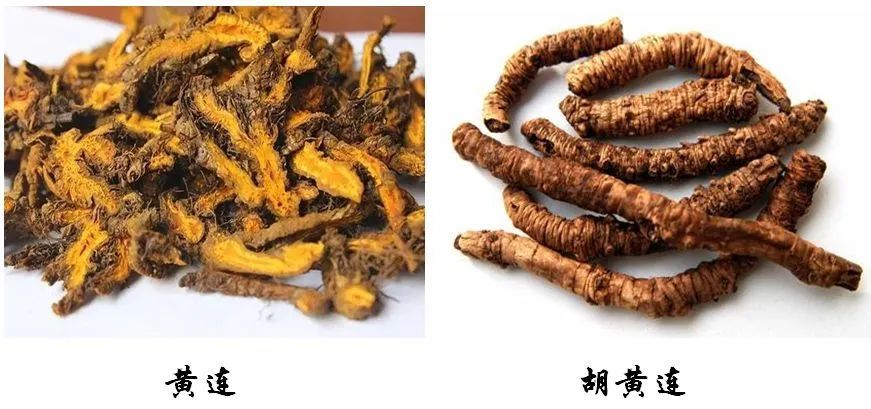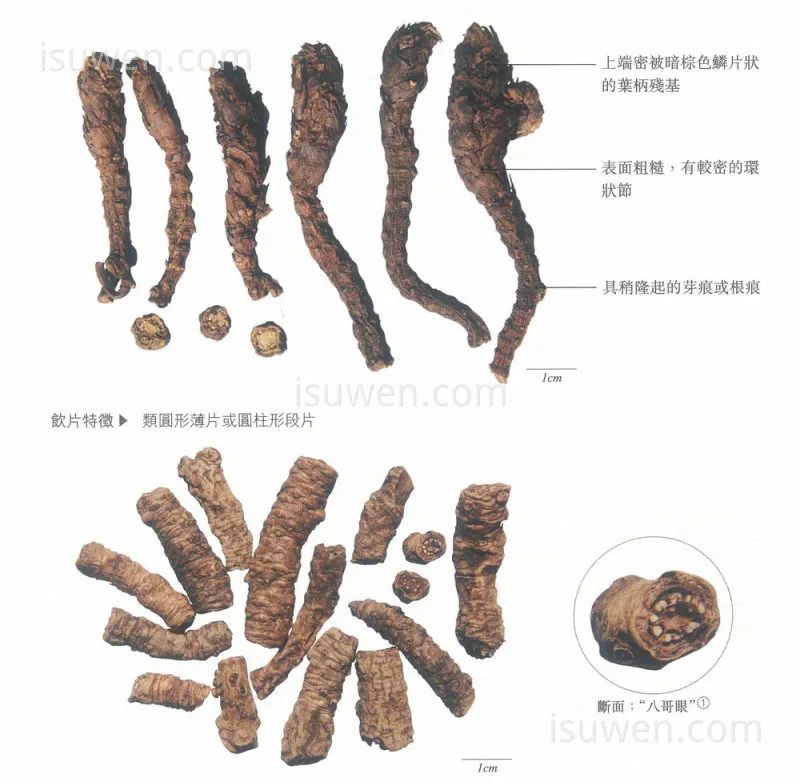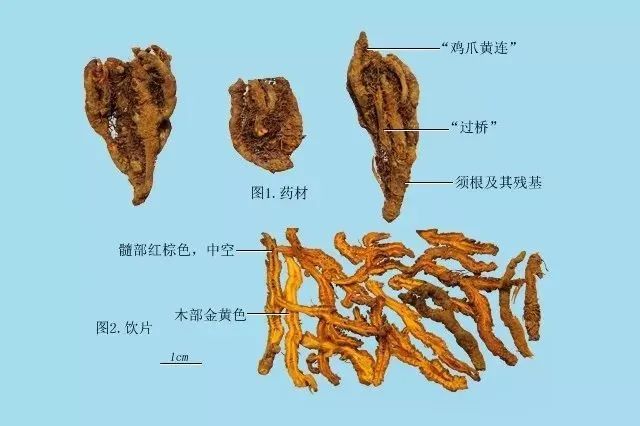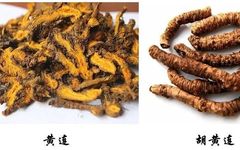
Editor: Qiao Qiao
Although Hu Huang Lian (Huang Lian) and Huang Lian (Coptis chinensis) differ by only one character, both possess the ability to clear heat and dry dampness. However, they are two distinct Chinese medicinal herbs with significant differences, and they should not be used interchangeably in prescriptions.This issue will introduce the characteristics and effects of both herbs.
Basic Information on Huang Lian
 Huang Lian (Coptis chinensis) is the dried rhizome of the Ranunculaceae family plant, Coptis chinensis, or its varieties. It has a bitter taste and a cold nature; it enters the Heart, Spleen, Stomach, Liver, Gallbladder, and Large Intestine meridians. It clears heat, dries dampness, drains fire, and detoxifies. It is indicated for damp-heat obstruction, vomiting with sour regurgitation, dysentery, jaundice, high fever with delirium, excessive Heart fire, irritability and insomnia, palpitations, blood-heat vomiting and nosebleeds, red eyes, toothache, thirst, and carbuncles; it is also used externally for eczema, damp sores, and purulent ear discharge. Due to its extreme cold nature, excessive or prolonged use can harm the Spleen and Stomach, and it is contraindicated in those with Spleen and Stomach deficiency-cold; moreover, its bitter and drying properties can injure Yin fluids, so caution is advised for those with Yin deficiency and fluid damage.
Huang Lian (Coptis chinensis) is the dried rhizome of the Ranunculaceae family plant, Coptis chinensis, or its varieties. It has a bitter taste and a cold nature; it enters the Heart, Spleen, Stomach, Liver, Gallbladder, and Large Intestine meridians. It clears heat, dries dampness, drains fire, and detoxifies. It is indicated for damp-heat obstruction, vomiting with sour regurgitation, dysentery, jaundice, high fever with delirium, excessive Heart fire, irritability and insomnia, palpitations, blood-heat vomiting and nosebleeds, red eyes, toothache, thirst, and carbuncles; it is also used externally for eczema, damp sores, and purulent ear discharge. Due to its extreme cold nature, excessive or prolonged use can harm the Spleen and Stomach, and it is contraindicated in those with Spleen and Stomach deficiency-cold; moreover, its bitter and drying properties can injure Yin fluids, so caution is advised for those with Yin deficiency and fluid damage.


Basic Information on Hu Huang Lian
 Hu Huang Lian (Picrorhiza scrophulariiflora) is the rhizome of the Scrophulariaceae family plant, Hu Huang Lian or Tibetan Hu Huang Lian. It has a bitter taste and a cold nature; it enters the Liver, Stomach, and Large Intestine meridians. It clears heat, cools the blood, and dries dampness; it is indicated for dysentery, convulsions, heat from exhaustion, spontaneous sweating, night sweats, hemoptysis, epistaxis, fire eye, and anal fistula. Caution is advised for those with Spleen and Stomach weakness.
Hu Huang Lian (Picrorhiza scrophulariiflora) is the rhizome of the Scrophulariaceae family plant, Hu Huang Lian or Tibetan Hu Huang Lian. It has a bitter taste and a cold nature; it enters the Liver, Stomach, and Large Intestine meridians. It clears heat, cools the blood, and dries dampness; it is indicated for dysentery, convulsions, heat from exhaustion, spontaneous sweating, night sweats, hemoptysis, epistaxis, fire eye, and anal fistula. Caution is advised for those with Spleen and Stomach weakness.
Similarities Between Hu Huang Lian and Huang Lian
 Both herbs are bitter and cold, clear heat, and dry dampness, and they both enter the Liver, Stomach, and Large Intestine meridians. They are effective in eliminating damp-heat accumulation in the Spleen, Stomach, and Large Intestine, and are key medicines for treating dysentery. Both should be avoided in cases of Spleen and Stomach deficiency-cold.
Both herbs are bitter and cold, clear heat, and dry dampness, and they both enter the Liver, Stomach, and Large Intestine meridians. They are effective in eliminating damp-heat accumulation in the Spleen, Stomach, and Large Intestine, and are key medicines for treating dysentery. Both should be avoided in cases of Spleen and Stomach deficiency-cold.
Differences Between Hu Huang Lian and Huang Lian


Different Effects
 Hu Huang Lian is particularly effective for treating heat due to Yin deficiency, heat from exhaustion, tidal fever, flushed cheeks, and night sweats; while Huang Lian is adept at draining excess fire from the Heart, indicated for excessive Heart fire disturbing the mind, irritability, and insomnia. Additionally, Hu Huang Lian can be used for pediatric dyspeptic fever, poor digestion, abdominal distension with emaciation, and persistent low fever; it is especially effective in clearing damp-heat accumulation in the Large Intestine, commonly used for treating hemorrhoids and pain; whereas Huang Lian is better for treating excess heat in the Sanjiao, high fever, and irritability; it excels in treating damp-heat stagnation in the Middle Jiao leading to Qi stagnation, fullness in the chest, vomiting with sour regurgitation, and toothache due to Stomach fire, carbuncles, and toxic sores.
Hu Huang Lian is particularly effective for treating heat due to Yin deficiency, heat from exhaustion, tidal fever, flushed cheeks, and night sweats; while Huang Lian is adept at draining excess fire from the Heart, indicated for excessive Heart fire disturbing the mind, irritability, and insomnia. Additionally, Hu Huang Lian can be used for pediatric dyspeptic fever, poor digestion, abdominal distension with emaciation, and persistent low fever; it is especially effective in clearing damp-heat accumulation in the Large Intestine, commonly used for treating hemorrhoids and pain; whereas Huang Lian is better for treating excess heat in the Sanjiao, high fever, and irritability; it excels in treating damp-heat stagnation in the Middle Jiao leading to Qi stagnation, fullness in the chest, vomiting with sour regurgitation, and toothache due to Stomach fire, carbuncles, and toxic sores.
Different Appearances
 Hu Huang Lian is a perennial herb with hairs. Its rhizome is cylindrical and slightly woody, measuring 15 to 25 cm in length. The leaves are near the base; they are somewhat leathery, spoon-shaped, 5 to 10 cm long, with a pointed tip and a narrow base forming a winged petiole, with serrated edges.
Hu Huang Lian is a perennial herb with hairs. Its rhizome is cylindrical and slightly woody, measuring 15 to 25 cm in length. The leaves are near the base; they are somewhat leathery, spoon-shaped, 5 to 10 cm long, with a pointed tip and a narrow base forming a winged petiole, with serrated edges.

Huang Lian is also a perennial herb, with basal leaves that are thick and paper-like, ovate-triangular, and three-parted, with the central lobe being ovate-rhombic, deeply lobed, and serrated edges, with lateral lobes unevenly deeply lobed.

Sources:“Huang Lian” and “Hu Huang Lian” Baidu Encyclopedia, “Differences Between Hu Huang Lian and Huang Lian” Yangshengzhijia website
Thank you for reading and sharing

Others are reading:
① Congratulations to the Journal Center of Guangzhou University of Chinese Medicine for the “Chinese Journal of New Drugs and Clinical Pharmacology” being selected again as a “Core Chinese Journal Overview” (2020 edition)
② Table of Contents for Issue 10 of 2021
③ Understanding the proverb “Eat radishes in winter and ginger in summer”?
【Statement】
The copyright of the images and text belongs to the original rights holder, and this platform is for non-commercial use. The views expressed are solely those of the author and do not represent the position of this platform. This article is published by the WeChat platform of Chinese New Drugs, please respect others’ labor, and when reprinting, please indicate “Reprinted from Chinese New Drugs (zyxylc)”! Direct copying without deletion of the source is prohibited!
Warm reminder:“Chinese Journal of New Drugs and Clinical Pharmacology” does not accept email submissions; please submit through the official website, link:http://www.zyxy.com.cn (you can directly click on “Read the original text” at the end).
If this article infringes your rights, please contact us promptly for authorization discussions or timely deletion!
Chinese New Drugs ∣Official account of a professional journal
 Long press to identify the QR code and follow us
Long press to identify the QR code and follow us

